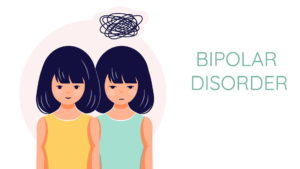Bipolar diseases or Types of bipolar disorders are a complicated and complex mental illness that has a major influence on mood, energy, and day-to-day functioning. An individual with bipolar disorder is prone to severe fluctuations in mood. It is like he feels a lot in a day from extreme to low behavior or emotional pattern. These mood swings can range from extremely low and despairing to extremely exciting and energizing episodes.
A person experiencing episodes of this disorder may feel excessively joyful, have a lot of energy, and take risks they wouldn’t ordinarily take. They may also feel as though they don’t require much sleep, talk very quickly, and are very idea-rich. However, during depressed periods, they may experience extreme sadness, low energy, loss of interest in activities they usually enjoy, and difficulty getting out of bed. These extreme mood swings can have an impact on a person’s everyday activities, social connections, and work.
Nonetheless, bipolar diseases can make the life of a person extremely challenging as he or she would have daunting emotional rides or reactions.
Recognizing the unique patterns and symptoms that each form of bipolar disease displays requires an understanding of the various types of bipolar disorders. This information helps with both accurate diagnosis and the creating of efficient treatment strategies.
Simply put, imagine experiencing severe fluctuations in your mood and energy levels if you have bipolar diseases. Imagine having boundless energy and feeling like the best person in the world. That is the sensation of a manic episode.
Imagine feeling the exact opposite now. A person experiencing a depressive episode is extremely depressed, exhausted, and hopeless and becomes disinterested in activities they once found enjoyable, finds it difficult to focus, and feels as though everything requires a lot of work.
A person with Types of bipolar disorders cannot snap out of it. It’s a medical problem that requires care, which frequently requires counseling and medication. People with bipolar diseases can control their symptoms and have healthy, fulfilling lives if they receive the appropriate care.
It is also important to be sensitive and concerned for those suffering from such conditions because it is hard for them. Being well-informed, understanding, and helpful can go a long way. Furthermore, speaking with a healthcare expert if you think you or someone you know have Types of bipolar disorders is extremely important. This is an important first step in receiving support and determining the best course of action.
Different Types of bipolar disorders

Cyclothymic Disorder, Bipolar I Disorder, Bipolar II Disorder, and other identified and unspecified bipolar and associated illnesses are the main types of bipolar disorders. With unique characteristics, mood episode lengths, and severity, each type has a thorough framework that needs to be comprehended.
Bipolar diseases can have an impact on your energy, mood, and capacity for daily functioning as mentioned. Extreme mood fluctuations, characterized by emotional highs (mania or hypomania) and lows (depression), are experienced by people with the illness. Let’s put it plainly this way there are types of this disease people suffer as;
Manic Depression (Bipolar I Disorder)
Bipolar I Disorder is one of the types of bipolar diseases characterized by extreme mood fluctuations, including both manic and depressed episodes.
Manic episodes have Excessive energy, excitement, or irritation accompanied by severe mood changes. These episodes are severe enough to require hospitalization or they last for at least seven days.
Episodes of depression in these bipolar diseases can have times when one feels incredibly depressed, hopeless, or empty. These are at least two weeks long.
There can be mixed episodes when mania and depression symptoms can occasionally coexist in a person.
Furthermore, rapid cycling is the term used to describe bipolar diseases in individuals who have four or more episodes of mania, hypomania, or depression in a year. Because of the frequent mood swings, this pattern can be particularly difficult to handle in daily life and maintain stable relationships.
Any kind of bipolar diseases can cause rapid cycling, which occasionally calls for more intensive or varied treatment modalities to assist in stabilizing mood fluctuations. It’s critical to collaborate closely with a medical professional to determine the most effective course of action for controlling rapid cycling and enhancing quality of life.
Bipolar II Disorder
When someone has bipolar II disorder, they do not experience the full-blown manic episodes that are indicative of bipolar I disease; instead, they suffer patterns of depressed and hypomanic episodes.
A person with Bipolar II disorder may experience extremely severe and protracted depression episodes, which can occasionally make it difficult for them to go about their everyday lives. Feelings of extreme low, pessimism, low energy, and lack of concern for past interests can all be part of these episodes in such bipolar diseases.
In opposition, hypomanic episodes in such bipolar diseases are less intense than full manic episodes but nevertheless involve higher mood, increased energy, and increased activity levels. Even yet, these Types of bipolar disorders still result in issues like poor judgment or strained relationships.
A difficulty associated with Bipolar II disease is that depressed episodes are more common and frequently continue longer than hypomanic episodes.

Cyclothymia, or Cyclothymic Disorder
Bipolar diseases in a milder form are called cyclothymia, sometimes referred to as cyclothymic disorder. For at least two years, people with cyclothymia suffer mood swings that are milder than those associated with bipolar I or bipolar II disorders.
A person with cyclothymia experiences periods of depression and hypomania. These symptoms, however, are not as severe or stubborn as the complete depression or hypomanic episodes associated with Bipolar I or II illnesses. Despite being less severe, the symptoms of Types of bipolar disorders can nevertheless create mental pain and interfere with day-to-day activities.
Individuals who suffer from cyclothymia frequently experience mood swings that can make life unpredictable and difficult. They frequently feel as though they are on an emotional rollercoaster.
Other specified and unspecified Bipolar and Related Disorders
Bipolar diseases symptoms in certain individuals don’t precisely fall into the above-mentioned categories. Even yet, these patterns have the potential to seriously damage and disturb people.
Even if the symptoms of a person don’t neatly fit into one of the recognized categories, these categories assist make sure they get the attention and care they need.
Symptoms and Indications of Bipolar Diseases

Extreme mood fluctuations caused by bipolar diseases alter a person’s feelings, behavior, and sleep patterns. Mood swings can continue for several days or weeks and are referred to as mood episodes. Manic episodes and depressed episodes are the two primary categories of mood episodes that have their respective characteristics.
The signs of a manic episode
In a manic episode of Types of bipolar disorders, individuals may perhaps:
- Experience intense happiness, excitement, or irritability
- Be more energetic or cheerful than normal
- Talk quickly about a wide range of topics; this is known as the flight of ideas.
- Feel mind racing
- Feel as though they can multitask without becoming tired.
- Take part in risky activities, such as excessive spending or overeating.
- Feel extraordinarily significant, gifted, or influential.
Signs and Symptoms of Depression
In the course of a depressed episode in bipolar diseases, persons may:
- Feel hopeless, empty, or nervous.
- Feel nervous or slow down.
- Experience difficulties sleeping, such as sleeping too much or having issues getting to sleep or staying asleep
- Speak slowly, feel as though they are at a loss for words, or forget things easily.
- Struggle to focus or decide what to do.
- Feel incapable of completing even easy jobs.
- Become disinterested in nearly everything in bipolar diseases.
- Feel worthless, empty of hope
Moreover, an episode with mixed features occurs when a person has both manic and depressed symptoms at the same time. For instance, individuals could experience great energy accompanied by intense sadness and hopelessness.
Hypomania
A milder variation of mania is called hypomania in bipolar diseases. Individuals suffering from hypomania may:
- Feel fantastic and work harder than usual.
- Able to work in day-to-day life
- They may not feel unwell, but others may observe behavioral or emotional shifts in them.
Hypomania can develop into severe mania or depression if left untreated.
Having Bipolar Diseases and Living with It

Identifying and avoiding the things that set off mood swings might help manage triggers in different Types of bipolar disorders.
- Maintaining a regular sleep, eating, and activity schedule helps reduce mood fluctuations.
- Maintaining relationships with positive family members, friends, and support organizations can be very beneficial.
- Maintaining the disorder requires regularly adhering to the treatment plan prescribed by medical professionals.
- Effective management of bipolar disease begins with an understanding of the condition. Individuals with bipolar disease can lead fulfilling, productive lives if they receive the right care and assistance.
- People need to have the right diagnosis, bipolar disease test, and treatment for bipolar disorder to support them in leading active, healthy lives. Here’s a quick summary of the procedure:
- Discuss your symptoms with a medical professional as soon as possible.
- To prevent any other disorders that might be the cause of your symptoms, the doctor will do a physical examination and may prescribe a bipolar disease test.
- After ruling out physical factors, the healthcare professional could perform a mental health assessment.
Nonetheless, here is a details analysis of Types of bipolar disorders. It is good and wise to be aware of things related to health so that people don’t suffer much when sadly they suffer any illness.













